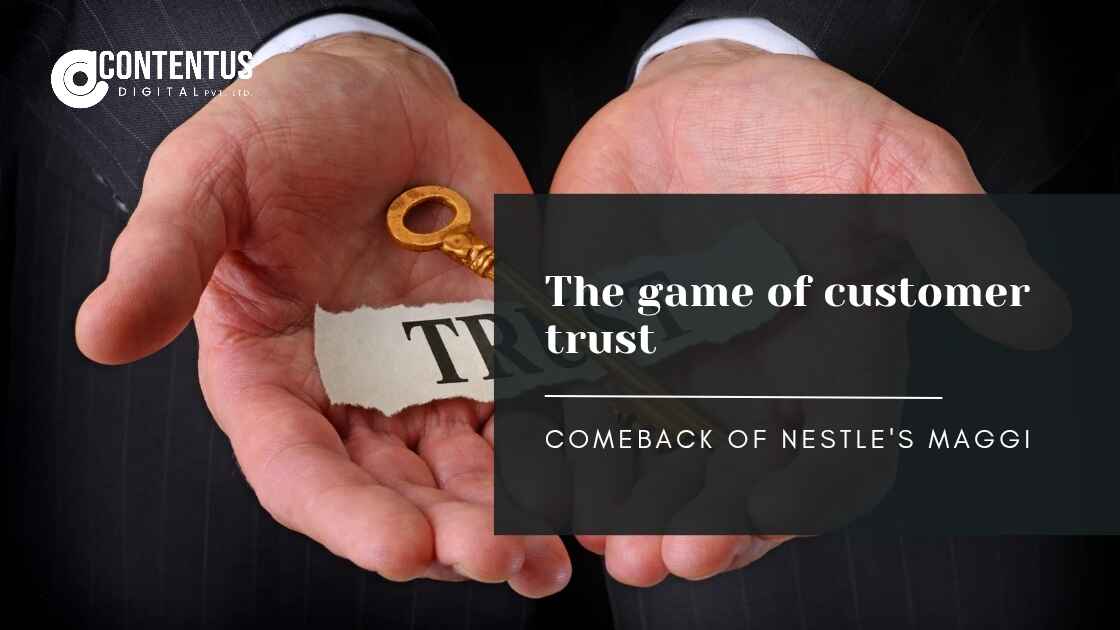The game of customer trust: Comeback of Nestle’s Maggi
Table of content
|
1 |
Introduction |
|
2 |
What is customer trust? |
|
3 |
Benefits of customer trust |
|
4 |
A case study: Nestle Maggi’s downfall and comeback |
|
5 |
How to build customer trust? |
|
6 |
Conclusion |
|
7 |
FAQs |
Can you imagine a business without customers? The answer is a huge NO. A company can’t stand out without loyal customers. But how do they become loyal towards your business? That’s the reason you should build a strong lineup for customer trust. And gaining loyal customers becomes impossible without customer trust.
Gartner research proved that 83% of customers reveal that they won’t purchase from brands they don’t trust.
Here, in this article, you will learn what customer trust actually is and how to build a strong customer trust base. Additionally, you can explore a real world case study about this matter.
What is customer trust?
Customer trust is the faith or belief for a brand from their consumers. It shows how dedicated and passionate a company becomes to fulfil their customers’ needs. Also, it proves that a company swiftly keeps their promises towards the users and does the right thing for them.
Benefits of customer trust
Here are the benefits that you can active by nurturing customer trust –
- Personalised experiences
The fundamental of personalised experiences is the customer trust. To provide a top-notch personalised experience for the users you must have access to their data. Now, customers agree to provide their details to you when they trust you. So, you must be responsible to protect their data from any kind of security threat and misusage. Then, analysing their data you can decide which personalised services are suitable for them. This way, you can provide a personalised experience.
- Customer loyalty
When your customers trust you, they will stay with your organisation for the long term. Also, they will believe that you can provide the best experience for them by analysing their needs and pain points. This way, they stay loyal to you and become leads for your products and services. Not only these, but they also refer your business to others and provide positive feedback.
- Build strong connections
A great customer loyalty ensures a long term customer journey. Therefore, they make repeat purchases from your brand. As a result, this frequent purchase habit builds strong connections with the users and builds a long-term relationship.
A case study: Nestle Maggi’s downfall and comeback
Now you will go through a real life case study to understand the power of customer trust better. All of you know about the world famous ‘2-Minute noodles’, Maggi from Nestle, right? Launched in 1983, Maggi is not only a brand, it has become an emotion of million people!
But in 2015, suddenly it lost its golden reputation due to the excessive amount of lead. Additionally, their ‘No added MSG’ labels mislead people. These two factors hurted Maggie’s reputation.
The crisis started when the officials of Uttar Pradesh, a state of India, found enormous levels of lead in the samples of Maggi. By June of 2015, the FSSAI (Food Safety and Standards Authority of India) levied a nationwide ban on Maggi. So, the brand immediately lost its ‘trust’ from the consumers. People, especially the mothers, accused them of being a betrayer as their ad campaigns come with the words like ‘Mummy, bhook lagi hai’. That means, Mom, I’m hungry.
Within a week, the FSSAI has announced it as banned, the brand has lost 80% of its market share.
As 30000+ tonnes of noodles had been destroyed, its sales dropped by 90%. Nestle India was troubled by INR 64.4 crore of loss in the first quarter within their 15 years of journey.
First, they have provided several technical explanations to the public. But the situation became worse day by day.
How do they set a comeback?
As Maggi is the emotion of millions of people, Nestle protected this factor to recover their forgotten fame. People believe that Maggi is not just a food, it has a huge power to bring a plate of taste in childhood, lunchboxes of school, evening snack, hostel life, gossip time, and more.
But the comeback wasn’t as easy as a piece of cake for the brand. During their absence, their rivals, such as ITC’s Yippee and Patanjali’s noodles, became the major dominants in the market. So, it indicates that once you lose your ground, it’s never easy to come back.
So, what did Maggi do for their comeback?
- The Nestle company produced full-page ads to assure consumers that Maggi is safe to eat. They flooded the mass media by publishing these ads.
- Also, they generated behind the scene manufacturing videos, detailed FAQs, and explainer videos across social media platforms and websites.
- Furthermore, they has initiated the #WeMissYouToo campaign. By doing this, Maggi got lots of responses from the people. They captured their day to day life moments through videos where Maggi was missed. And every post had an end with a simple yet powerful line ‘We miss you too’.
- Again Nestle had started other campaigns like #LetYour MomKnow and #MotingLikeMaggi. Through these Maggi accepted user generated content and side by side ensured that Maggie is absolutely safe to eat. These movements also drive a massive positive impression from the users.
- Finally, Maggie was relaunched with a partnership with Snapdeal.
Result
By March of 2016, Maggi got back its 50% of market share. Then at the end of 2017, it grabbed 60% market share with an extraordinary comeback.
Apart from Masala Maggi, the food product comes with other variants. Side by side they continued their campaigns across TV, social media, print media, and retail activations.
Lesson
Customer trust is the foremost factor for a business to stand in the crowd. It has two fundamental parameters – the feelings and facts. So, it’s not just about nostalgia, you should employ a feeling that they will be privileged by utilising your products/services. However, there should be a trust factor that the product is absolutely safe to use and there would be no side effects after using it.
Here Maggi made a wrong step. They started emotional storytelling without scientifically proving its safety. That’s why people didn’t believe them at first and became more furious to see their posts. Then, realising their faults, Maggie had started experiments on the samples. They have tested over 3500 samples of Maggi across India and other countries such as the USA, Canada, UK, and Singapore. The Nestle company employed court-mandated third-party testing from the NABL (National Accreditation Board for Testing and Calibration Laboratories) recognised labs. Then, it has been scientifically proven that the lead levels in Maggi were within permissible limits. After that their compelling posts connected people emotionally and they eventually got back their lost fame. Now, Maggi sells 6 billion products each year in India that makes them the world’s largest noodle sellers.
So, this incident proves that safety is a major factor for customer trust.
How to build customer trust?
To build a potential customer-trust, you must adopt a customer-centric mindset and approach. Here are the simple tricks on how to work on them –
- Prioritise customer service
The sales and support teams must consider high quality customer service standards. So,the first and foremost action you should take is to provide a unique experience for the users by personalising their interactions. According to the Zendesk Customer Experience Trends Reports, 76% of users prefer personalised interactions. So, they want the brands to collect their data to make their experience better.
For instance, you can recommend a better product based upon their purchase history, offer discounts, etc. To offer an excellent personalised solution you should analyse customer needs in-deep, transparent pricing information, offer a quick call back so that the customer doesn’t have to wait, and more. Also, use CRM software to automate your regular workflows related to customer service.
- Focus on transparency and authenticity
Apart from business terms and policies you should invest in transparency and privacy. So, you must explain how you protect users’ personal information, and how to safeguard these from data breaches. These explanations assure customers that you’re concerned about their safety and responsible enough to protect their data. Hence, the users trust you and feel safe to provide their data to you.
Research shows that most of the customers are highly concerned about how the businesses use their data. Also, they have lots of interest about how you treat your customers. Do you only interact with the users during a sale? Do you connect with them throughout the year? If you only contact them during sales, it seems like you’re only treating them as an option for a transaction. So, be cautious about it and value your customers.
Ensure the documentation like service level agreements (SLAs) are available for the users. Moreover, vividly explain your company’s capabilities and offerings. Also, tell them about service limitations, upcoming potential products, and assurance to provide support in case of any issue occurrence. These make your customers feel validated and they become loyal to you.
- Share customers’ feedback
Customer reviews and testimonials are more trustworthy than the business’s marketing campaigns. Research shows that 9 out of 10 customers believe in users’ reviews more than what the businesses say about themselves. Thus sharing customer reviews to the audience can add more credibility to your business.
Again you can organise several activities to collect customer feedback.
So, creating polls on social media, sending outreach emails, or surveys would be the best strategies to gain feedback from your customers on a regular basis. This way you can provide them the opportunities of expressing their opinions towards your business. These opinions become valuable assets for your business through which you can understand if there is any requirement for improving your products or services. Hence customer reviews help to streamline and scale up your business.
Also, it’s a great way to show that you genuinely value your customers’ opinion. So, it proves that you’re honest and you gain trust and value from your customers.
- Build a strong connection with customers
To strengthen your customer trust you should join in the natural conversation with your customers. It doesn’t mean you should pick up the phone and call them. Then, how is it possible? Join in the forums like Quora, Reddit and reply to the users query. Also, you can create your own branded community to connect them. Then directly reply to them on social media threads, live chats, emails or comment sections of your website.
However, you must ensure that your sales and support team use a personalised tone and style during the conversation.
In case of complex queries you should provide access to the valuable resources for your customers, in-depth explanation, and solutions.
These activities not only improve customer trust but also increase brand loyalty and customer retention.
- Track metrics that align with customer trust
By tracking the metrics that align with trust factors you can measure your business’s trustworthiness. These include click through rate, conversion rate, customer retention rate, bounce rate, customer lifetime value, repeat purchase and referrals etc.
So, don’t just rely on traditional metrics, instead measure the metrics that are helpful in digital marketing. These metrics build trust and foster long term relationships with the customers.
Conclusion
Achieving customer trust is not a piece of cake. It must be earned and needs lots of nurturing to protect it. It should be maintained continuously. Thus, understand your buyers’ persona, provide excellent experience, and foster a strong relationship with them.
FAQs
- How do we gain customer trust?
Here are the steps to gain customer trust –
- Make a purposeful product
- Show the value of your company
- Be transparent
- Build strong relationships with your customers
- Actively help them in problem solving
- Showcase positive user reviews to your audience
- Maintain your business ethics and reputation
- Why is customer trust important in e-commerce?
To increase customer retention rate and generate more ROI, the e-commerce brands should earn customer trust.







